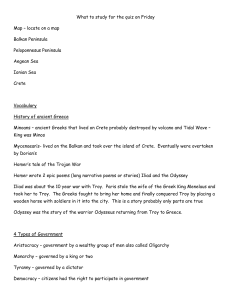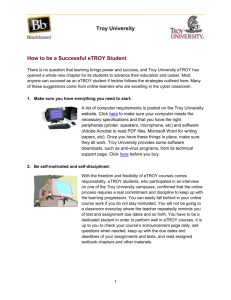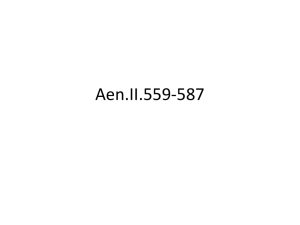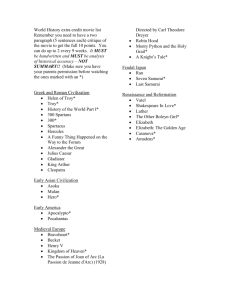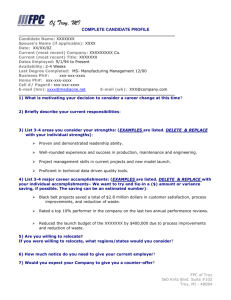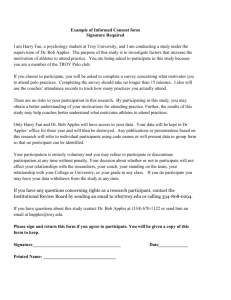TROY UNIVERSITY UNIVERSITY COLLEGE – AUGUSTA 2743
advertisement
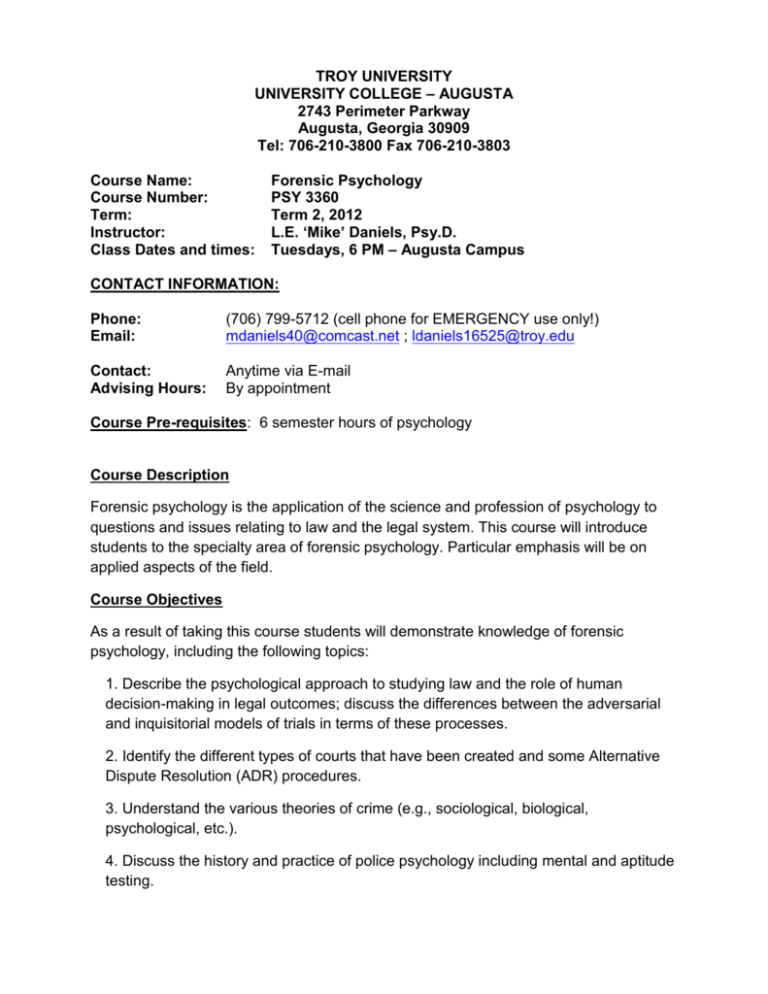
TROY UNIVERSITY UNIVERSITY COLLEGE – AUGUSTA 2743 Perimeter Parkway Augusta, Georgia 30909 Tel: 706-210-3800 Fax 706-210-3803 Course Name: Course Number: Term: Instructor: Class Dates and times: Forensic Psychology PSY 3360 Term 2, 2012 L.E. ‘Mike’ Daniels, Psy.D. Tuesdays, 6 PM – Augusta Campus CONTACT INFORMATION: Phone: Email: (706) 799-5712 (cell phone for EMERGENCY use only!) mdaniels40@comcast.net ; ldaniels16525@troy.edu Contact: Advising Hours: Anytime via E-mail By appointment Course Pre-requisites: 6 semester hours of psychology Course Description Forensic psychology is the application of the science and profession of psychology to questions and issues relating to law and the legal system. This course will introduce students to the specialty area of forensic psychology. Particular emphasis will be on applied aspects of the field. Course Objectives As a result of taking this course students will demonstrate knowledge of forensic psychology, including the following topics: 1. Describe the psychological approach to studying law and the role of human decision-making in legal outcomes; discuss the differences between the adversarial and inquisitorial models of trials in terms of these processes. 2. Identify the different types of courts that have been created and some Alternative Dispute Resolution (ADR) procedures. 3. Understand the various theories of crime (e.g., sociological, biological, psychological, etc.). 4. Discuss the history and practice of police psychology including mental and aptitude testing. 5. Describe basic information processing in regard to eyewitness and child testimony. 6. Identify methods of evaluating deception by criminal suspects, including the detection of false confessions. 7. Describe the steps in the legal process between arrest and trial, including psychological influences on the plea-bargaining process; describe the procedures and processes involved when a case is brought to trial. 8. Identify the legal standards for competency and the assessment of insanity in criminal and juvenile cases; analyze the considerations relevant to forensic assessment in civil cases. 9. Understand how jury representativeness is influenced by the jury selection process; evaluate the decision processes of juries. 10. Understand victimology and the psychological effects of victimization, describe the psychology of sexual assault and distinguish between battering, date rape, pedophilia, and sexual harassment. 11. Evaluate the purposes of punishment and sentencing, including the death penalty; apply psychological study of the law in an examination of juvenile and adult corrections. 12. Explain different research methods used by psychologists and evaluate the appropriateness of conclusions derived from psychological research. 13. Demonstrate effective writing skills and application of APA style. Required Textbooks Forensic Psychology Fulero, Solomon M. / Wrightsman, Lawrence S. Edition: 3RD 09 ISBN-10: 0-495-50649-4 ISBN-13: 978-0-495-50649-2 Publisher: Wadsworth, Inc. Author: The textbook provider for the eCampus of Troy University is MBS Direct. The Web site for textbook purchases is: http://www.mbsdirect.net Required Supplementary Materials Without Conscience: The Disturbing World of the Psychopaths Among Us Author: Hare, Robert D. Edition: 93 ISBN: 1-57230-451-0 Publisher: Guilford Press Attendance: Class attendance is expected. All work missed must be made up. If an absence will cause a student to miss an exam, especially a final exam, they must provide evidence of emergency status. If you know in advance that you may be out of town, have scheduled surgery, etc. then it is the student’s responsibility to contact the professor to see if there are dates for turning work in earlier or to make other arrangements. Attendance is your responsibility. Roll will be taken each class period and attendance will be reported to the Troy University Office. Unless you provide documentation of emergent mitigating circumstances, absence from class will adversely affect your class participation grade (if you’re not there, you can’t participate). Excessive absence will result in a grade of FA (failure due to excessive absence) per Troy policies. University policy states that in registering for classes at the university, students accept responsibility for attending scheduled class meetings, completing assignments on time, and contributing to class discussion and exploration of ideas. A student will be excused for class absence for circumstances beyond the student’s control or if the student has been required to attend an activity sponsored by the university. Incomplete Grades An “Incomplete” may only be given to students whose progress in a course has been satisfactory, but who are unable to receive a final grade because of circumstances beyond their control. A student must formally request an incomplete and give the reason(s) to the professor. An “Incomplete” for continuing students must be removed by the midterm of the next term of enrollment, or one calendar year, if you drop out of Troy University and are temporarily not taking classes. Students who receive “Incompletes” should be aware of regulations related to “Incompletes”. An “Incomplete” not removed during the specified time, automatically becomes an “F”. Method of Evaluation: Students will take two examinations, a midterm and a final. There are two writing assignments for the course. Students will also receive a grade for class participation. Mid-Term Exam Final Exam Writing assignment Class Participation Research paper = = = = = 20% 30% 20% 10% 20% (4th week - on-line) (last day of class) (TBD) (due on last day of class) Assignment of Grades: A = 90-100% (Thorough demonstrated understanding of the subject.) B = 80-89% C = 70-79% D = 60-69% F = less than 60% Writing assignment Write a THOROUGH summary outline of the required reading: Hare, Robert D. (1999) Without Conscience: The Disturbing World of the Psychopaths among Us. New York: Guilford Press Research Paper: Each student will conduct research on an approved topic in advance. The paper should be fifteen (15) pages or more of research findings, typed and double-spaced. All references must be cited in a bibliography and in the paper. The paper will be graded based on its substantive content as it relates to topic, evidence of reading and research, style and grammar. The style of the paper should follow the rule of the Publication Manual of the American Psychological Association. Research papers will be due on the specific date the Professor will announce. While students may not be required to give a formal presentation, they may be asked to share their findings in class. All papers submitted electronically via Blackboard or Email should be in Word format. APA Style Resources Tips, examples, questions Electronic references : http://www.psywww.com/resource/apacrib.htm : http://www.apastyle.org/previoustips.html : http://www.apastyle.org/elecgeneral.html TECHNOLOGY REQUIREMENTS - Students must have: • A reliable working computer that runs Windows XP or higher. • A TROY e-mail account that you will access regularly • E-mail software capable of sending and receiving attached files. • Access to the Internet with a 56.6 kb modem or better. (High speed connection such as cable or DSL preferred) • A personal computer capable of running Netscape Navigator 7.0 or above, Internet Explorer 6.0 or above or current versions of Firefox or Mozilla. Students who use older browser versions will have compatibility problems with Blackboard. • Microsoft WORD software. (I cannot grade anything I cannot open! This means NO MS-Works, NO WordPad, and NO WordPerfect) • Virus protection software, installed and active, to prevent the spread of viruses via the Internet and e-mail. It should be continually updated! Virus protection is provided to all Troy students free of charge. Click on the following link https://it.troy.edu/downloads/virussoftware.htm and then supply your e-mail username and password to download the virus software. Honor Code: The awarding of the university degree attests that an individual has demonstrated mastery of a significant body of knowledge and skills of substantive value to society. Any type of dishonesty in securing those credentials therefore invites serious sanctions, up to and including suspension and expulsion (cf. Standards of Conduct in each TU Bulletin). Examples of dishonesty include actual or attempted cheating, plagiarism*, or knowingly furnishing false information to any university employee. *Plagiarism is defined as submitting anything for credit in one course that has already been submitted for credit in another course, or copying any part of someone else’s intellectual work, published or unpublished, including that of other students, and portraying it as one’s own. Proper quoting, using strict APA guidelines (as specified by your instructor), is required at all times. Troy University uses plagiarism-detection software to identify instances of full or partial plagiarism. On-line Library: Troy University University’s on-line library services are available to all currently registered students and may be accessed through TU libraries web site https://uclibrary.troy.edu. When you get to Troy University Libraries home page, click on the word "Remote Services" and follow the instructions. Problems with accessing the TU on-line library should be referred to the Distance Learning Coordinator at, 334-6859555 or 334-687-4744. In addition to what is available at local libraries, all TU registered students may access on-line journal databases—ie. UMI ProQuest Direct and IAC SearchBank--through the TU Web Site. Troy University Augusta students may also use the library facilities of the state college where you reside. South Carolina residents may use the library at University of South Carolina in Aiken. Georgia residents may use the library at Augusta State University. Corporate reports can be found in “EDGAR” at http://www.freeedgar.com Helpful links and addresses: Augusta website http://www.augusta.troy.edu Troy Main website – http://www.troy.edu Troy University online Library - https://uclibrary.troy.edu Blackboard – www.troy.edu/blackboard/blackboard.html MBS Books - http://mbsdirect.net Americans with Disabilities Act (ADA): Troy University supports Section 504 of the Rehabilitation Act of 1973 and the Americans With Disabilities Act of 1990, which insure that postsecondary students with disabilities have equal access to all academic programs, physical access to all buildings, facilities and events, and are not discriminated against on the basis of disability. Eligible students, with appropriate documentation, will be provided equal opportunity to demonstrate their academic skills and potential through the provision of academic adaptations and reasonable accommodations. Further information, including appropriate contact information, can be found at the following link: http://www.troy.edu/humanresources/ADAPolicy2003.htm Communications: Cell Phones in class will be put on vibration or turned off. If you must take a call during class, please quietly exit the room, complete your call, and return as soon as possible. The preferred method of communication with the instructor is via Email. (A cell phone number is provided for emergency use only.) In almost all cases you will receive a reply to your Email within 24 hours. Please include your name and class/cohort in any message header, including messages with attachments. Please insure that all attachments also have your name and cohort on the first page. Web-Enhanced Instructional Activities: This course may include web-enhanced instructional activities. Therefore, Blackboard may be utilized in a number of ways including: group and individual work, communication, virtual chat, discussions, storing and dropping assignments into the digital drop box, and using the discussion board to post messages, articles, and relevant web sites. (Note: Web enhanced curriculum is not homework, it is part of the curriculum.) Web Enhanced days: TBD

